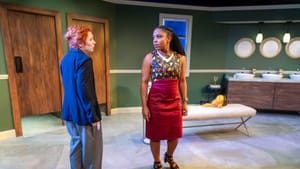Stay in the Loop
BSR publishes on a weekly schedule, with an email newsletter every Wednesday and Thursday morning. There’s no paywall, and subscribing is always free.
Echoes of the Bad Art Friend
Montgomery Theater presents R. Eric Thomas’s Mrs. Harrison

Even among the current class of contemporary theater, Mrs. Harrison has a lot on its mind. Now running at Montgomery Theater, the play bristles with a sharp immediacy, not simply for its central confrontation but for its topical scope. So much of its thematic currency speaks directly to our present moment, with discursive echoes of the Bad Art Friend, of parasocial relationships, of who can tell a particular story, and when and why.
It’s a shame, then, that the rest of the script is such a crude vessel for the timeliness of its ideas. While there are a few moments that soar—where the characters richly embody the multifarious concepts at play—they are ultimately subsumed in a dramatic construction that wants clarity and consequence.
Delicate ambiguity
Written by R. Eric Thomas and directed here by Kristen Heckler, Mrs. Harrison opens in a faculty restroom, the evening of a college reunion, on two women who haven’t spoken in years. Aisha (Chali Cooke) is a Black playwright with an acclaimed Broadway show; Holly (Jenna Kuerzi) a white standup comedian whose artistic career has mostly stalled in the decade since graduation. Vocational differences aside, the two also have contrasting memories of their time in school. Where Holly reminisces on episodes of deep friendship between her and Aisha, Aisha doesn’t seem to remember her at all.
It’s in this dynamic that the play is most compelling, fashioning a delicate ambiguity from the discordance of these memories. Does Aisha truly not remember Holly? Has Holly fabricated a mental relationship that never really existed? For much of the play, it’s hard to say, but one thing is clear: in the time between then and now, Holly has developed a simmering hatred for Aisha, a moldering resentment for all the years where Holly would text her, tweet at her, and hear nothing back.
A stalled dynamic
Kuerzi finds a nicely textured bitterness in her portrayal of Holly, a sycophantic wheedling that curdles into barely contained rage. Her performance makes an obvious mask of certain liberal niceties, one that curls away from Holly’s veneer-like brittle wallpaper and reveals a special kind of enmity. Years of thinking about Aisha spill out in this encounter, years of mental rehearsal for this exact moment. We become uncomfortably aware of how much Holly wants to be her, how much she detests her for it, how her hatred for Aisha is perhaps only secondary to her hatred for herself.
While Cooke brings a smooth presence to offset Holly’s hostility, her work never quite matches the depth of her counterpart. Some of this can be blamed on the script. Unlike Holly, who is constantly on the verge of eruption, Aisha spends most of the play a closed book, withholding her true feelings. Yet even with this dramatic handicap, Cooke is less contained than she is blank, never finding a reason for why she stays in the bathroom for so long. Rather than surrendering to Holly, she seems to have resigned herself to the dictates of the play. This is a two-hander, after all, so she must remain for the show to go on.
This is where, even amidst a handful of truly compelling scenes, the play fails to coalesce. All theater is a contrivance, of course, but the hand of the playwright is especially forceful here, guiding the characters through each scene in a way that detaches us from their inner lives. Holly confronts Aisha on her years of silence, and then the conversation reverts to casual talk between two artists, as if the previous topic had never been broached. The play thus doesn’t escalate so much as it stalls. We know there will be some final secret, the inevitable revelation, but there is no reason for its continual delay other than that we haven’t yet reached the end of the running time.
A Black story?
There is still much to enjoy along the way, particularly in how the play asks what kind of story belongs to whom. At one point, Holly dubs Aisha’s play (also called Mrs. Harrison) a “Black story.” Why must it be a Black story, Aisha asks, when it features two characters, one white and one Black? It’s a question that casts light back on itself, on the play that is unfolding before us. We are asked to consider our expectations in the year 2024 when two characters, one white, one Black, appear onstage.
By the play’s end, however, these compelling questions become secondary to the play’s dramaturgical imprecision. A late-act twist announces itself in starts and stops, attendant with choppy direction and overbearing lighting (designed by Jim Leitner) that subtracts from the climax’s dramatic weight. We lose the uncertainty of Holly and Aisha’s memories, the ambiguity that has fueled the play so far, for a final scene that is less an ending than a sudden stop.
What, When, Where
Mrs. Harrison. By R. Eric Thomas, directed by Kristen Heckler. $35. Through February 25, 2024, at Montgomery Theater, 124 N Main Street, Souderton. (215) 723-9984 or montgomerytheater.org.
Accessibility
Montgomery Theater is fully wheelchair-accessible. Wheelchair seating must be requested at the time of ticket purchase.
Sign up for our newsletter
All of the week's new articles, all in one place. Sign up for the free weekly BSR newsletters, and don't miss a conversation.

 Kiran Pandey
Kiran Pandey